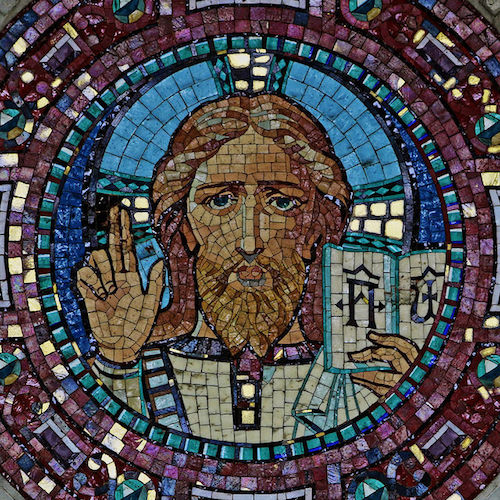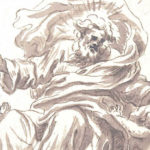We run our website the way we wished the whole internet worked: we provide high quality original content with no ads. We are funded solely by your direct support. Please consider supporting this project.

The Centrality of Christ in Hebrews, Part 1
The intense Christocentricity that the New Testament writers embrace is nowhere more clearly and consistently illustrated than in the book of Hebrews. Throughout this work we find a repeated emphasis on the many ways the revelation given to us in Christ surpasses that of the Old Testament. The author begins by stressing how the revelation of God in his own Son contrasts with and surpasses all previous revelations by virtue of the fact that the Son alone is the “radiance of God’s glory” and the “exact representation of his being” (Heb. 1:3). Consistent with this, the first ten chapters of this work are structured around Christ’s superiority:
- to angels, (1:5-2:18)
- to Moses (3:1-4:13)
- to the Aaronic Priesthood (4:4-7:28)
- to the High Priests and their sacrifices (chapters 8-10)
Reflecting this same perspective, the author sees the tabernacle erected by Moses to be a “copy” and “shadow” of the “true tabernacle set up by the Lord” (8:1-6). So too, the activity of the high priest on the day of the atonement in the OT was, for this author, the Holy Spirit’s way of “showing … that the way into the Most Holy Place had not yet been disclosed.” It thus serves as “an illustration (parabolē) for the present time” of the inferiority of the OT practices and the superiority of the sacrifice Christ makes and of the new covenant he brings (Heb. 9:8-28).
In the same way, the author of Hebrews held that “the law is only a shadow of the good things that are coming—not the realities themselves,” for the law could never “make perfect those who draw near to worship” (10:1). Only the sacrifice of Jesus—the reality to which the law and everything else in the OT points—can perfect people before God once and for all (10:10,14).
Given this perspective, we are hardly surprised to find this author discerning Christ in a wide array of OT passages. Let’s look at the opening chapter as a prime example. The author of Hebrews begins by interpreting the song that was sung at the coronation of a king (Ps. 2:7) to be a song about the enthronement of Christ (Heb 1:5). The author then goes on to demonstrate the superiority of Christ over angels by applying a reworked version of Psalm 104:4 to angels, showing them to be mere servants of Yahweh, while applying Psalm 45:6-7 to Christ, for this latter Psalm is a tribute to “God” whose “throne … will last forever and ever” (Heb 1:7-8).
And finally, to buttress Christ’s superiority over angels even further, this author goes on to apply to Christ a song about Yahweh’s work as Creator (Heb 1:10, cf. Ps 102:25-27). The circular way this author uses Scripture to prove Christ’s superiority simply reveals that he is approaching the OT with the assumption that it is a collection of works that is about Christ.
In the next post, we will explore a few more examples of how the writer of Hebrews puts Christ at the center of the Old Testament.
Photo credit: Leo Reynolds via Visual hunt / CC BY-NC-SA
Category: General
Tags: Bible Interpretation, Christocentrism, Cruciform Theology, New Testament, Old Testament
Topics: Christology
Related Reading

God’s Love is Cruciform
Paul instructs us in what it means to follow Jesus, when he stated, “Follow God’s example, therefore, as dearly loved children and walk in the way of love, just as Christ loved us and gave himself up for us as a fragrant offering and sacrifice to God (Eph 5:1-2). Here Paul defines what it means to…

What Is God’s Glory?
In John 12 we find a view of God’s glory that challenges many modern notions of what the glory of God means. In this passage, we find that Jesus was “troubled” by the cross that lay ahead to such an extent that he wanted to cry out, “Father, save me.” But Jesus quickly expresses his…

The REAL Problem with Divine Violence in the OT
As I mentioned in my previous blog, while I will continue to offer video-blogs responding to questions that come in, I’m also planning on sprinkling in reflections based on my forthcoming book, Crucifixion of the Warrior God, over the next couple months. Today, I just want to state what I consider to be the real…

When God Wears Masks
At various times throughout the OT we find Yahweh assuming the role of a tester, refiner, punisher and even an enemy of Israel (e.g. Jer. 9:7; Lam. 2:5; Isa 63:10). Yet, when we examine these roles, or masks, in the light of the crucified Christ and the broader canonical witness, it becomes clear that these…

Podcast: Isn’t God Withdrawing the SAME as Him Personally Punishing and Causing Violence?
Greg discusses whether the passivity of withdrawal is distinguishable from active punishment. http://traffic.libsyn.com/askgregboyd/Episode_0186.mp3

The Cross Above All Else
The way to know what a person or people group really believes is not to ask them but to watch them. Christians frequently say, “It’s all about Jesus,” but our actions betray us. Judging by the amount of time, energy, and emotion that many put into fighting a multitude of battles, ranging from the defense…
